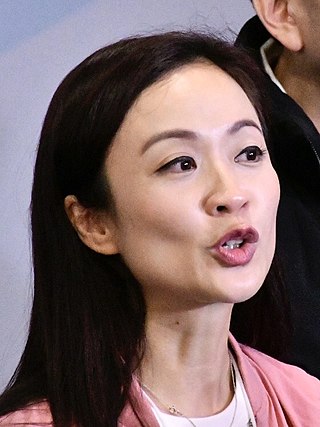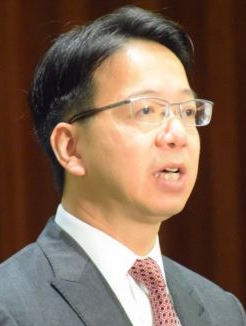Related Research Articles

The Democratic Party (DP) is a liberal political party in Hong Kong. The party generally sits at the centre to centre-left of the Hong Kong political spectrum. Chaired by Lo Kin-hei, it is the flagship party in the pro-democracy camp and currently has no elected representatives in the District Councils.

The Hong Kong Association for Democracy and People's Livelihood (ADPL) is a Hong Kong pro-democracy social-liberal political party catering to grassroots interest with a strong basis in Sham Shui Po. Established on 26 October 1986, it was one of the three major pro-democracy groups along with the Meeting Point and the Hong Kong Affairs Society in the 1980s.

Frederick Fung Kin-kee, SBS, JP is a former member of the Legislative Council of Hong Kong from 1991 to 1997 and from 2000 to 2016 and the former chairman of the pro-democracy Hong Kong Association for Democracy and People's Livelihood (ADPL) from 1989 to 2007.

The United Democrats of Hong Kong was the first political party in Hong Kong. Founded in 1990, the short-lived party was the united front of the liberal democracy forces in preparation of the 1991 first ever direct election for the Legislative Council of Hong Kong. The party won a landslide victory by sweeping 12 of the 18 directly elected seats in the election which shook the political landscape of Hong Kong. In 1994 it was merged with another pro-democracy party Meeting Point to form the contemporary Democratic Party.

The Kowloon West geographical constituency was one of the five geographical constituencies of the Legislative Council of Hong Kong from 1998 to 2021. It was established in 1998 for the first SAR Legislative Council election and was abolished under the 2021 overhaul of the Hong Kong electoral system. In the 2016 Legislative Council election, it elected six members of the Legislative Council using the Hare quota of party-list proportional representation. It had 602,733 registered electorates in 2020. The constituency corresponded to the districts of Yau Tsim Mong, Sham Shui Po, and Kowloon City.

The pro-democracy camp, also known as the pan-democracy camp, is a political alignment in Hong Kong that supports increased democracy, namely the universal suffrage of the Chief Executive and the Legislative Council as given by the Basic Law under the "One Country, Two Systems" framework.

The 2011 Hong Kong District Council elections were held on 6 November 2011. Elections were held to all 18 District Councils of Hong Kong, returning 412 members from directly elected constituencies, each selecting a council member. After the government's constitutional reform package was passed in 2010, five new seats in the Legislative Council would be created in which the candidates would be nominated by all District Councillors.

Meeting Point was a liberal political organisation and party in Hong Kong formed by a group of former student activists in the 1970s and intellectuals for the discussion for the Sino-British negotiation on the question of Hong Kong prospect in 1983. It was one of the earliest groups in Hong Kong that favoured Chinese sovereignty over Hong Kong but wanted a free, democratic and autonomous Hong Kong.

The Fifth Legislative Council of Hong Kong was the fifth meeting of the legislative branch of the Hong Kong Special Administrative Region Government. The membership of the LegCo is based on the 2012 election. The term of the session is from 1 October 2012 to 30 September 2016, during the term in office of the Chief Executive Leung Chun-ying. Due to the new arrangements agreed in a contentious LegCo vote in 2010, the session consists of the new total of 70 seats in LegCo, ten more than previously, with 35 members elected in geographical constituencies through direct elections, and 35 members in functional constituencies, in which five District Council (Second) functional constituency seats each represent all 18 District councils of Hong Kong voted for by all resident voters in Hong Kong. The Democratic Alliance for the Betterment and Progress of Hong Kong remained the largest party while the pan-democrats secured the one-third crucial minority. Notable new members of the LegCo members include Gary Fan from the new established party Neo Democrats and first openly gay councillor, People Power's Ray Chan Chi-chuen.

The Fourth Legislative Council of Hong Kong was the fourth meeting of the legislative branch of the Hong Kong Special Administrative Region Government. The membership of the LegCo is based on the 2008 election. The term of the session is from 1 October 2008 to 30 September 2012, during the second half of the Donald Tsang's administration and first two months of the Leung Chun-ying's term in office. The meeting place was moved from the Legislative Council Building to the new built Legislative Council Complex in 2011. The Democratic Alliance for the Betterment and Progress of Hong Kong remained the largest party with 10 seats. Notable newcomers to the Legislative Council included Regina Ip, Priscilla Leung, Wong Yuk-man, Tanya Chan, and Paul Tse.

The 2016 Hong Kong Legislative Council election was held on 4 September 2016 for the 6th Legislative Council of Hong Kong (LegCo). A total of 70 members, 35 from geographical constituencies (GCs) and 35 from functional constituencies (FCs), were returned. The election came after the rejection of the 2016/2017 constitutional reform proposals which suggested the electoral method for the 2016 Legislative Council remains unchanged.

Nelson Wong Sing-chi is a Hong Kong politician and social worker. He had been member of the Legislative Council of Hong Kong between 2000–04 and 2008–12. He was the founding member of the Democratic Party before he was expelled in 2015 for his support in the government's constitutional reform proposals. He was also briefly a founding member of the Third Side, a centrist political party.

The 2015 Hong Kong District Council elections were held on 22 November 2015. Elections were held to all 18 District Councils with returning 431 members from directly elected constituencies after all appointed seats had been abolished.

The 2016 New Territories East by-election was held on 28 February 2016 after the incumbent Legislative Councillor Ronny Tong Ka-wah of New Territories East quit the Civic Party and resigned from the Legislative Council of Hong Kong (LegCo), effective on 1 October 2015.
Third Side is a political party in Hong Kong which claims to offer a "third road" to democracy, positioned between the pro-democracy camp and the pro-Beijing camp. It is led by Tik Chi-yuen, who was a co-founder and longtime member of the Democratic Party until his expulsion in 2015 for promoting political reforms proposed by the Chinese central government.

Path of Democracy is a political group and think tank established in 2015 in Hong Kong. It is led by former Civic Party legislator Ronny Tong, who joined the Executive Council on 1 July 2017. Although officially unaligned with either the pro-Beijing camp or the pro-democracy camp, the group has been supportive of the policies and legislation put forward by the former, and was considered by the media to be pro-Beijing by 2021.

These are the District Council (Second) functional constituency results of the 2016 Legislative Council election. The election was held on 4 September 2016 and all 5 seats in were contested. The pan-democracy camp failed to achieve coordination and fielded six candidate lists while the pro-Beijing camp fielded only three seats, two for Democratic Alliance for the Betterment and Progress of Hong Kong (DAB) and one for the Hong Kong Federation of Trade Unions (FTU). FTU incumbent Chan Yuen-han was no longer eligible for running as she retired from the District Council and Association for Democracy and People's Livelihood (ADPL) and Democratic Party incumbents Frederick Fung and Albert Ho lost their eligibility for running as they lost their District Council seats.

The 2018 Kowloon West by-election was held on 25 November 2018 after the incumbent pro-democracy Legislative Councillor Lau Siu-lai of Kowloon West was disqualified from the Legislative Council of Hong Kong (LegCo) after the oath-taking controversy resulted in the disqualifications of the six pro-democracy and localist legislators. It followed the by-election of four other vacated seats on 11 March 2018. Chan Hoi-yan, a nonpartisan backed by the pro-Beijing camp won over veteran democrat Lee Cheuk-yan of the Labour Party, a backup candidate for the pro-democracy camp after Lau's candidacy was disqualified.

The 2018 Hong Kong Legislative Council by-election was held on 11 March 2018 for four of the six vacancies in the Legislative Council of Hong Kong (LegCo) - the Hong Kong Island, Kowloon West and New Territories East geographical constituencies and the Architectural, Surveying, Planning and Landscape functional constituency - resulting from the disqualification of six pro-democrat and localist camp Legislative Council members over the 2016 oath-taking controversy. The by-election for the two other seats was not held due to pending legal appeals by the two disqualified legislators.
References
- ↑ Chih-Jou Jay Chen & Victor Zheng (2021). Changing Attitudes toward China in Taiwan and Hong Kong in the Xi Jinping Era. "... voters includes voters who responded as independent voters, moderate groups (中間派), 'all supported,' 'neither supported,' and 'not a party ...". 中央研究院社會學研究所 [Institute of Sociology, Academia Sinica].
- ↑ "葵青同道投建制 泛民難翻盤". Archived from the original on 2018-11-12. Retrieved 2018-11-12.
- ↑ "愛國社團推薦 民建聯優先 194人名單 自由黨僅佔2". Archived from the original on 2018-11-12. Retrieved 2018-11-12.
- ↑ "七成民意認同 港需溫和中間派". 香港商報. 2015-10-07. Archived from the original on 2016-03-14.
- ↑ "得票無增長 中間派感失望". 香港太陽報. 2016-03-01. Archived from the original on 2016-03-14. Retrieved 2016-03-14.
- ↑ "險勝方國珊 梁國雄幸保尾席". 香港蘋果日報. 2016-09-06. Archived from the original on 2016-09-07. Retrieved 2016-09-06.